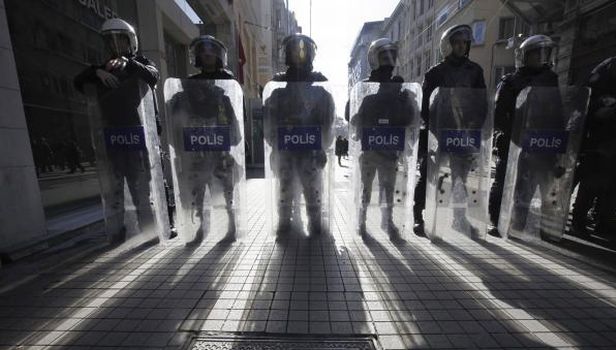
Riot police stand guard in front of the Russian Consulate as Circassians living in Turkey gather to protest against Sochi Winter Olympics in Istanbul (REUTERS/Osman Orsal )
Amid international outcry over Sochi, another, little-known, controversy came to my attention after I tweeted and blogged about my participation in the torch relay. Members of Turkey’s Circassian community bombarded my mailbox with angry messages, one saying I would be bearing “the blood of Circassians.”
The Circassians originally hail from the northwest Caucasus; Sochi and the ski resort, Krasnaya Polyana, sit right on their ancestral homeland. This was where the Russians ethnically cleansed the Circassians during, and in the years following, the Caucasian War (1817–64). While hundreds of thousands perished during the expulsion, many were deported to the Ottoman Empire, the natural recipient for Circassians, who are Sunni Muslims.
The population forced to migrate is estimated to be around 1.5 million, accounting for nearly 90 percent of the total population of this region at the time, according to Professor Mitat Çelikpala from Istanbul’s Kadir Has University.
Many believe there was a tacit understanding between Russia and the Ottoman Empire for the forced resettlement of Circassians. Their deportation suited the interests of the Ottomans who needed Muslim fighters to crush insurgencies throughout the empire.
“The north Caucasians who live in Turkey today are descendants of the people who were forced to leave. Currently most of them reside in Turkey, but smaller populations are spread across many countries including the US, Europe, Canada, Jordan, Syria, and Israel,” explained Çelikpala. In fact, you can still see Circassian bodyguards in their traditional dress striding through the royal palace in Jordan.
Circassians in Turkey did not escape the Republic’s efforts to create a distinctly Turkish nation state out of the multi-ethnic Ottoman Empire. “The Circassians in Turkey say: ‘We fought and served this country, yet we were made to forget our native language, whereas Circassians that still live in Russia, they speak their own language, this is unfair,’” explains Fehim Taştekin, a journalist familiar with the issue.
According to Circassians their expulsion in the mid-nineteenth century was the first genocide in history, but until recently they marked the tragedy quietly. This year marks 150 years since their deportation, and the Winter Olympics have provided an opportunity for remembrance and the awakening of a Circassian nationhood, a kind of Circassian renaissance, says Çelikpala.
The Circassian awakening has actually been gathering pace for several years in Turkey. Turkey’s accession process to the European Union brought about reforms on minority rights that raised hopes among Circassians of a cultural revival. As restrictions on broadcasting and education in the Kurdish language are being lifted, Circassians have also stepped up efforts to promote their language and culture.
But this revival has never been about an outright rejection of their Turkish identity. “Circassians have no problem with their upper Turkish identity . . . while Circassians are extremely conscious of their ethnic identity, the majority don’t think they have been assimilated. On the contrary, they are thankful to Turkey for being their host, they feel part of this country and in fact they consider themselves among the essential rulers of Turkey,” said journalist Mete Belovacıklı.
All views expressed in this blog post are those of the author and do not necessarily represent the views of, and should not be attributed to Asharq Al-Awsat.
